Schmitt C.B. (ed.) The Cambridge History of Renaissance Philosophy
Подождите немного. Документ загружается.

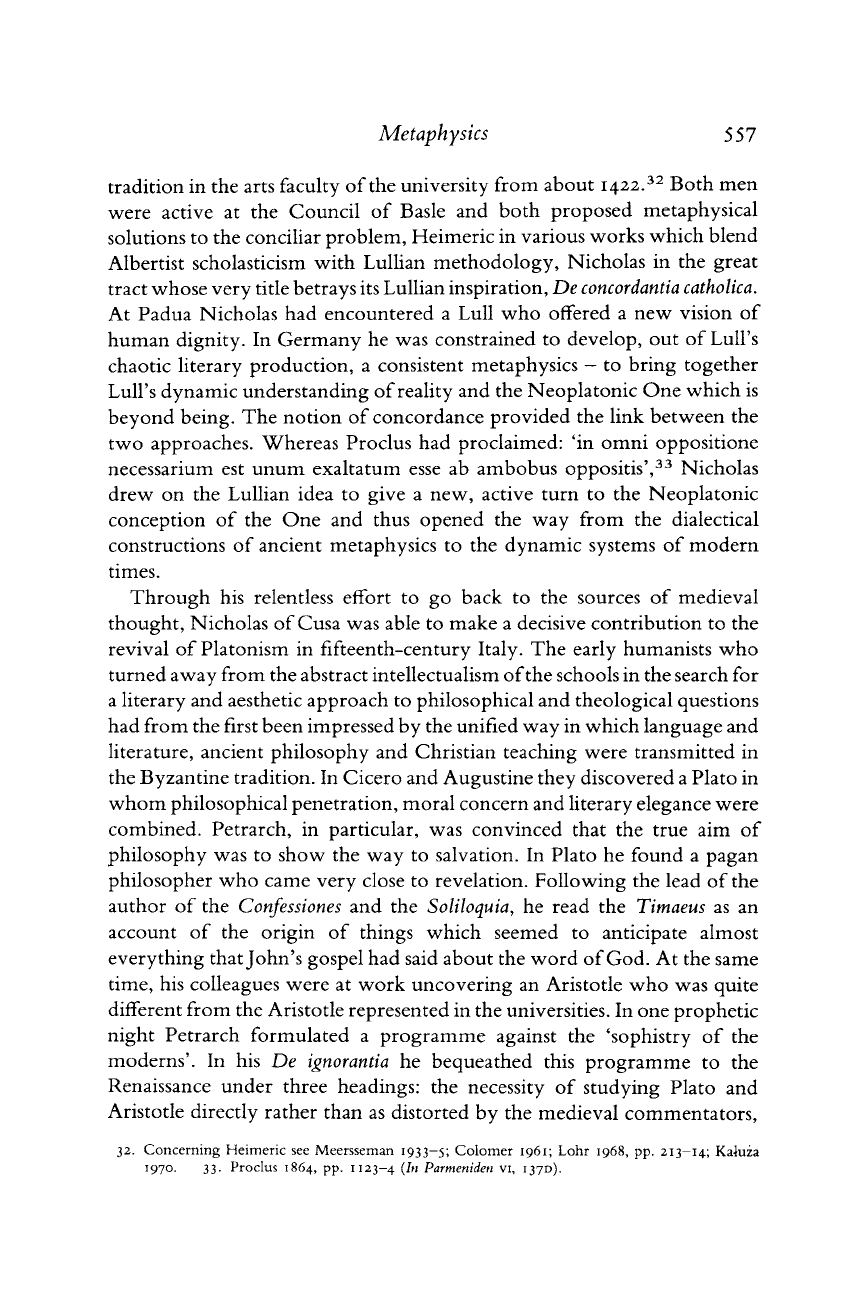
Metaphysics
557
tradition in the
arts
faculty of the university from about
1422.
32
Both men
were active at the Council of Basle and both proposed metaphysical
solutions to the conciliar problem, Heimeric in various works which blend
Albertist
scholasticism with Lullian methodology, Nicholas in the great
tract
whose very title betrays its Lullian inspiration, De concordantia catholica.
At
Padua Nicholas had encountered a
Lull
who offered a new vision of
human dignity. In Germany he was constrained to develop, out of Lull's
chaotic literary production, a consistent metaphysics - to bring together
Lull's
dynamic understanding
of
reality and the Neoplatonic One which is
beyond being. The notion of concordance provided the link between the
two
approaches. Whereas Proclus had proclaimed: 'in omni oppositione
necessarium est unum exaltatum esse ab ambobus oppositis',
33
Nicholas
drew on the Lullian idea to
give
a new, active
turn
to the Neoplatonic
conception of the One and
thus
opened the way from the dialectical
constructions of ancient metaphysics to the dynamic systems of modern
times.
Through his relentless effort to go back to the sources of medieval
thought, Nicholas of Cusa was able to make a decisive contribution to the
revival
of Platonism in fifteenth-century Italy. The early humanists who
turned
away from the abstract intellectualism
of
the schools in the search for
a literary and aesthetic approach to philosophical and theological questions
had from the first been impressed by the unified way in which language and
literature, ancient philosophy and Christian teaching were
transmitted
in
the Byzantine tradition. In
Cicero
and Augustine they discovered a Plato in
whom
philosophical penetration, moral concern and literary elegance were
combined. Petrarch, in particular, was convinced
that
the
true
aim of
philosophy was to show the way to salvation. In Plato he found a pagan
philosopher who came very close to revelation. Following the lead of the
author
of the Confessiones and the Soliloquia, he read the Timaeus as an
account of the origin of things which seemed to anticipate almost
everything
that
John's
gospel had said about the word
of
God.
At the same
time, his colleagues were at work uncovering an Aristotle who was quite
different from the Aristotle represented in the universities. In one prophetic
night Petrarch formulated a programme against the 'sophistry of the
moderns'. In his De ignorantia he bequeathed this programme to the
Renaissance
under
three
headings: the necessity of studying Plato and
Aristotle
directly
rather
than
as distorted by the medieval commentators,
32.
Concerning
Heimeric
see
Meersseman
1933-5;
Colomer
1961;
Lohr
1968, pp. 213-14;
Kaluza
!970. 33-
Proclus
1864, pp.
1123-4
(In Parmeniden vi, 137D).
Cambridge Histories Online © Cambridge University Press, 2008
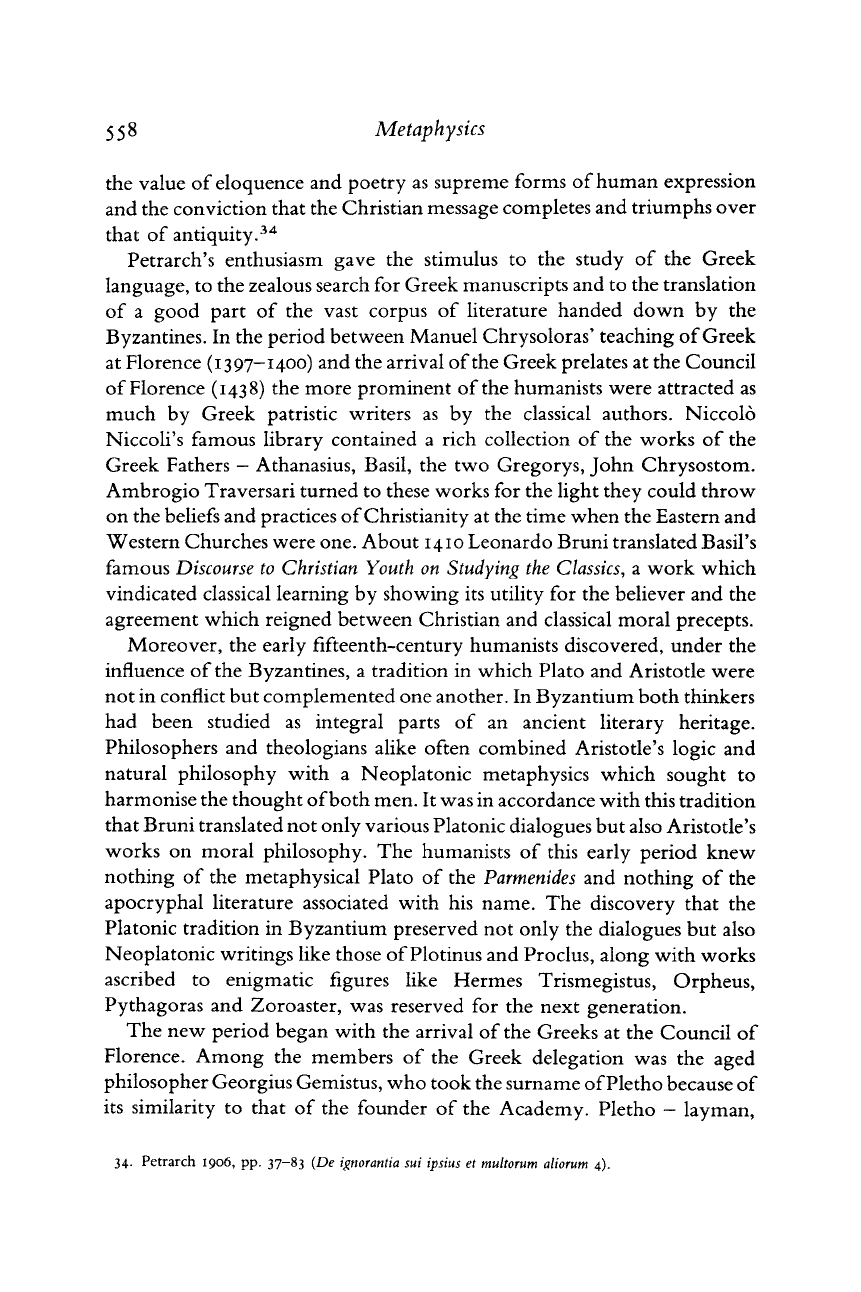
558
Metaphysics
the value of eloquence and poetry as supreme forms of human expression
and the conviction
that
the Christian message completes and
triumphs
over
that
of antiquity.
34
Petrarch's enthusiasm gave the stimulus to the study of the Greek
language,
to the zealous search for Greek manuscripts and to the translation
of
a good
part
of the vast corpus of
literature
handed down by the
Byzantines.
In the period between Manuel Chrysoloras' teaching
of
Greek
at Florence (i 397-1400) and the arrival
of
the Greek prelates at the Council
of
Florence (1438) the more prominent of the humanists were attracted as
much by Greek patristic writers as by the classical authors. Niccolo
Niccoli's
famous library contained a rich collection of the works of the
Greek
Fathers
—
Athanasius,
Basil,
the two Gregorys,
John
Chrysostom.
Ambrogio
Traversari
turned
to these works for the light they could throw
on the beliefs and practices
of
Christianity at the time when the Eastern and
Western Churches were one. About
1410
Leonardo Bruni translated Basil's
famous Discourse to Christian Youth on Studying the Classics, a work which
vindicated classical learning by showing its utility for the believer and the
agreement which reigned between Christian and classical moral precepts.
Moreover,
the early fifteenth-century humanists discovered,
under
the
influence of the Byzantines, a tradition in which Plato and Aristotle were
not in conflict but complemented one
another.
In Byzantium both thinkers
had been studied as integral
parts
of an ancient literary heritage.
Philosophers and theologians alike often combined Aristotle's logic and
natural
philosophy with a Neoplatonic metaphysics which sought to
harmonise the thought
of
both men. It was in accordance with this tradition
that
Bruni translated not only various Platonic dialogues but also Aristotle's
works
on moral philosophy. The humanists of this early period knew
nothing of the metaphysical Plato of the Parmenides and nothing of the
apocryphal
literature
associated with his name. The discovery
that
the
Platonic tradition in Byzantium preserved not only the dialogues but also
Neoplatonic writings like those
of
Plotinus and Proclus, along with works
ascribed to enigmatic figures like Hermes Trismegistus, Orpheus,
Pythagoras and Zoroaster, was reserved for the next generation.
The
new period began with the arrival of the Greeks at the Council of
Florence. Among the members of the Greek delegation was the aged
philosopher Georgius Gemistus, who took the
surname
of
Pletho because of
its similarity to
that
of the founder of the Academy. Pletho - layman,
34.
Petrarch
1906, pp.
37-83
(De
ignorantia
sui ipsius et
multorum
aliorum
4).
Cambridge Histories Online © Cambridge University Press, 2008
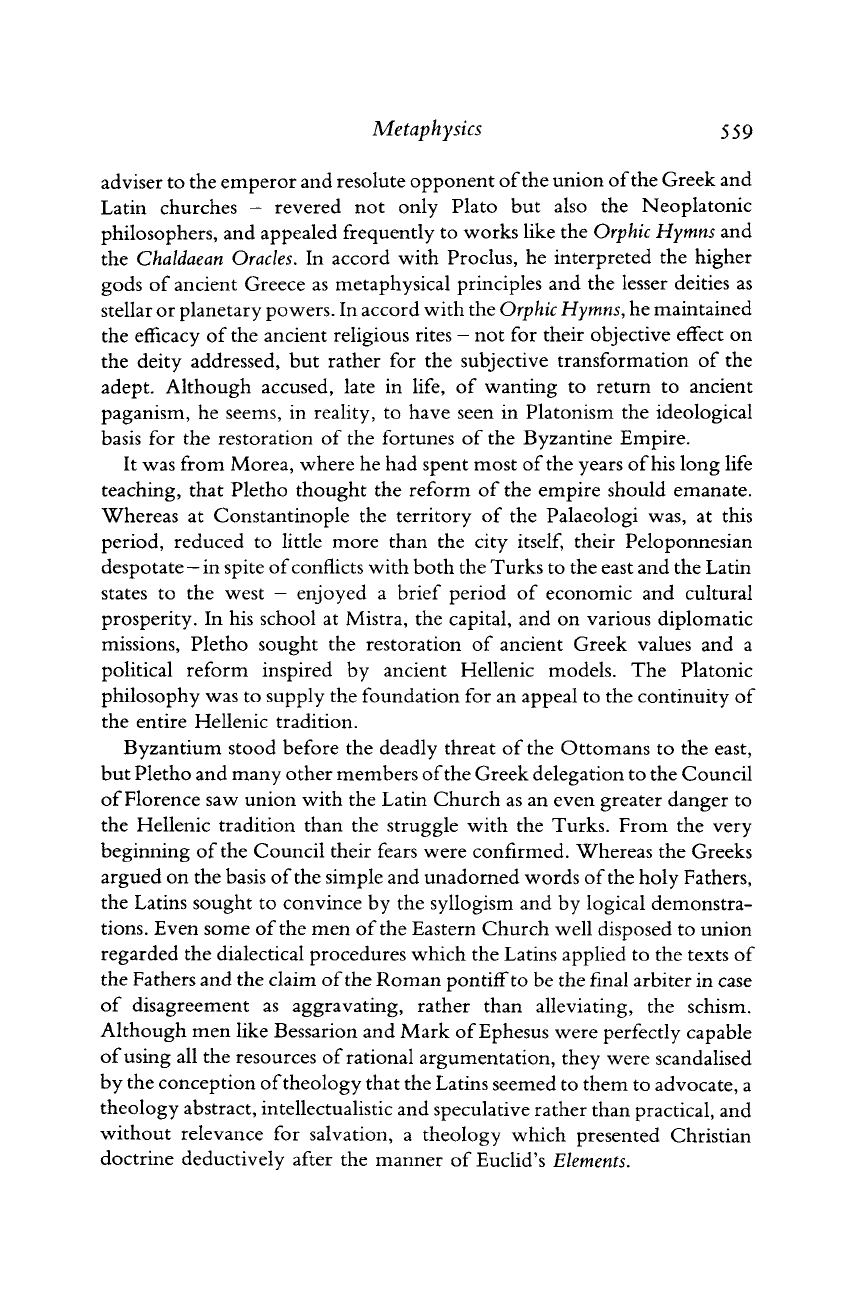
Metaphysics
559
adviser to the emperor and resolute opponent
of
the union
of
the Greek and
Latin churches - revered not only Plato but also the Neoplatonic
philosophers, and appealed frequently to works like the Orphic
Hymns
and
the Chaldaean Oracles. In accord with Proclus, he
interpreted
the higher
gods
of ancient Greece as metaphysical principles and the lesser deities as
stellar or planetary powers. In accord with the Orphic
Hymns,
he maintained
the
efficacy
of the ancient religious rites - not for their objective
effect
on
the deity addressed, but
rather
for the subjective transformation of the
adept. Although accused, late in
life,
of wanting to
return
to ancient
paganism, he seems, in reality, to have seen in Platonism the ideological
basis for the restoration of the fortunes of the Byzantine Empire.
It was from Morea, where he had spent most of the years
of
his long
life
teaching,
that
Pletho thought the reform of the empire should emanate.
Whereas at Constantinople the territory of the Palaeologi was, at this
period, reduced to little more
than
the city itself, their Peloponnesian
despotate - in spite
of
conflicts
with both the Turks to the east and the Latin
states to the west — enjoyed a brief period of economic and cultural
prosperity. In his school at Mistra, the capital, and on various diplomatic
missions, Pletho sought the restoration of ancient Greek values and a
political
reform inspired by ancient Hellenic models. The Platonic
philosophy was to supply the foundation for an appeal to the continuity of
the
entire
Hellenic tradition.
Byzantium
stood before the deadly
threat
of the Ottomans to the east,
but Pletho and many other members
of
the Greek delegation to the Council
of
Florence saw union with the Latin Church as an even greater danger to
the Hellenic tradition
than
the struggle with the Turks. From the very
beginning of the Council their fears were confirmed. Whereas the Greeks
argued on the basis
of
the simple and unadorned words
of
the holy Fathers,
the Latins sought to convince by the syllogism and by
logical
demonstra-
tions. Even some of the men of the Eastern Church
well
disposed to union
regarded the dialectical procedures which the Latins applied to the texts of
the Fathers and the claim
of
the Roman
pontiff
to be the final arbiter in case
of
disagreement as aggravating,
rather
than
alleviating, the schism.
Although
men like Bessarion and Mark
of
Ephesus were perfectly capable
of
using all the resources of rational argumentation, they were scandalised
by
the conception
of
theology
that
the Latins seemed to them to advocate, a
theology
abstract, intellectualistic and speculative
rather
than
practical, and
without relevance for salvation, a theology which presented Christian
doctrine deductively after the
manner
of Euclid's Elements.
Cambridge Histories Online © Cambridge University Press, 2008
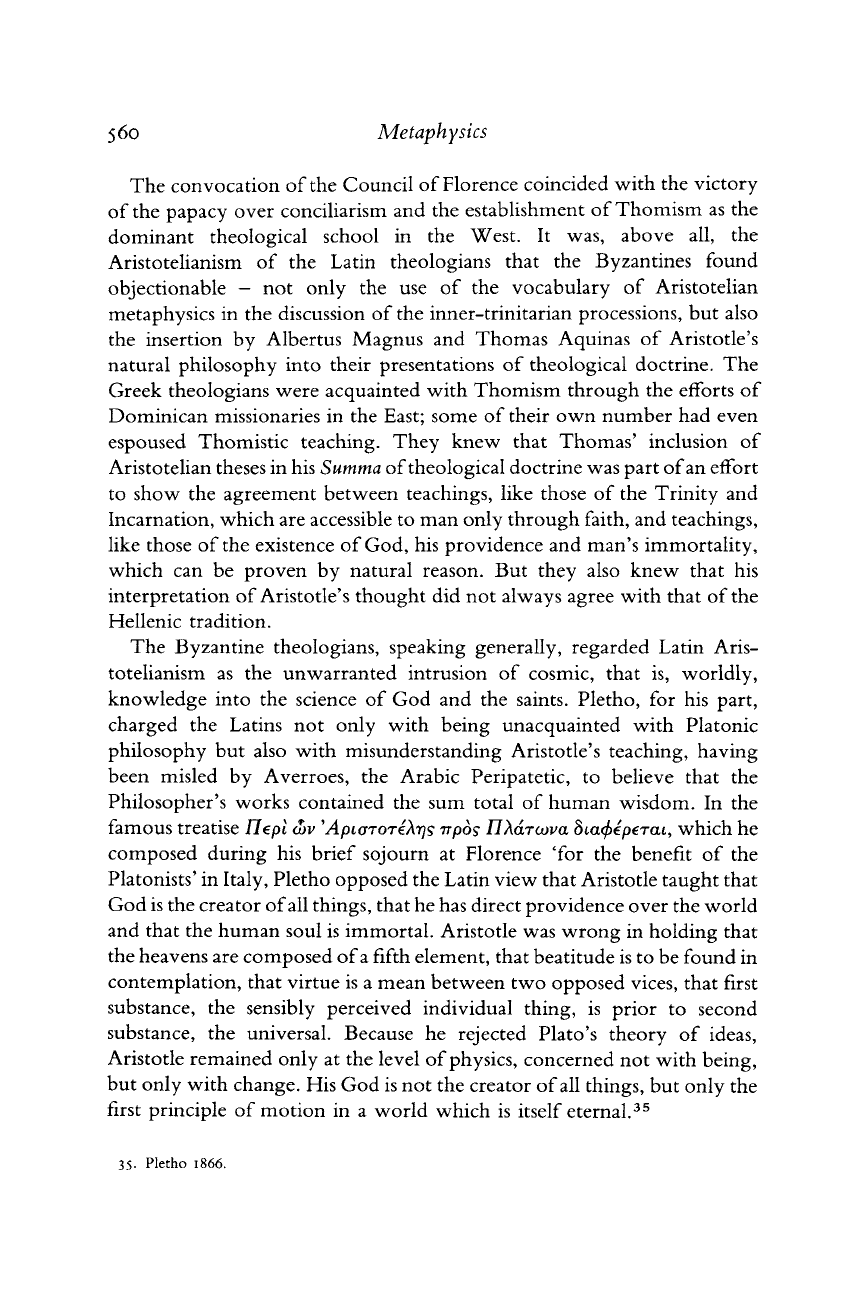
Metaphysics
The
convocation of the Council of Florence coincided with the victory
of
the papacy over conciliarism and the establishment of Thomism as the
dominant theological school in the West. It was, above all, the
Aristotelianism of the Latin theologians
that
the Byzantines found
objectionable - not only the use of the vocabulary of Aristotelian
metaphysics in the discussion of the
inner-trinitarian
processions, but also
the insertion by Albertus Magnus and Thomas Aquinas of Aristotle's
natural
philosophy into
their
presentations of theological doctrine. The
Greek
theologians were acquainted with Thomism through the efforts of
Dominican missionaries in the East; some of
their
own number had even
espoused Thomistic teaching. They knew
that
Thomas' inclusion of
Aristotelian theses in his
Summa
of
theological
doctrine was
part
of
an effort
to show the agreement between teachings, like those of the Trinity and
Incarnation, which are accessible to man only through faith, and teachings,
like
those of the existence of God, his providence and man's immortality,
which
can be proven by
natural
reason. But they also knew
that
his
interpretation
of Aristotle's thought did not always agree with
that
of the
Hellenic tradition.
The
Byzantine theologians, speaking generally, regarded Latin
Aris-
totelianism as the unwarranted intrusion of cosmic,
that
is, worldly,
knowledge
into the science of God and the saints. Pletho, for his
part,
charged the Latins not only with being unacquainted with Platonic
philosophy but also with misunderstanding Aristotle's teaching, having
been misled by Averroes, the Arabic Peripatetic, to believe
that
the
Philosopher's works contained the sum total of human wisdom. In the
famous
treatise
ITepi cbv
'
ApiaroriXr^s irpos JJXdrcjva Sta^cperou, which he
composed during his brief sojourn at Florence Tor the benefit of the
Platonists' in Italy, Pletho opposed the Latin
view
that
Aristotle taught
that
God
is the creator
of
all
things,
that
he has direct providence over the world
and
that
the human soul is immortal. Aristotle was wrong in holding
that
the heavens are composed
of
a fifth element,
that
beatitude is to be found in
contemplation,
that
virtue is a mean between two opposed
vices,
that
first
substance, the sensibly perceived individual thing, is prior to second
substance, the universal. Because he rejected Plato's theory of ideas,
Aristotle
remained only at the
level
of physics, concerned not with being,
but only with change. His God is not the creator of all things, but only the
first principle of motion in a world which is itself eternal.
35
35.
Pletho
1866.
Cambridge Histories Online © Cambridge University Press, 2008
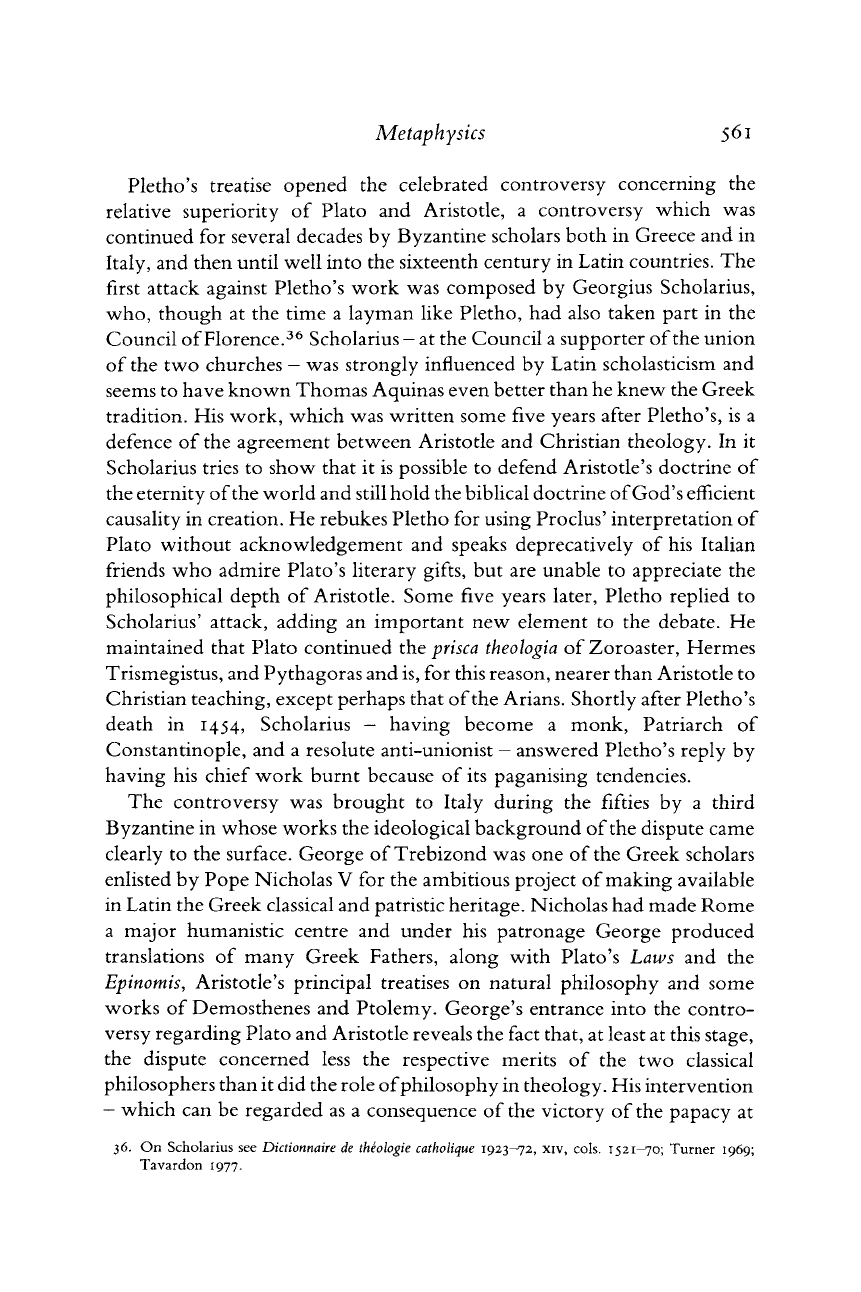
Metaphysics
561
Pletho's treatise opened the celebrated controversy concerning the
relative superiority of Plato and Aristotle, a controversy which was
continued for several decades by Byzantine scholars both in Greece and in
Italy, and
then
until
well
into the sixteenth century in Latin countries. The
first attack against Pletho's work was composed by Georgius Scholarius,
who,
though at the time a layman like Pletho, had also taken
part
in the
Council
of
Florence.
36
Scholarius
—
at the Council a supporter
of
the union
of
the two churches
—
was strongly influenced by Latin scholasticism and
seems to have known Thomas Aquinas even
better
than
he knew the Greek
tradition. His work, which was written some
five
years after Pletho's, is a
defence of the agreement between Aristotle and Christian theology. In it
Scholarius tries to show
that
it is possible to defend Aristotle's doctrine of
the eternity
of
the world and still hold the biblical doctrine
of
God's
efficient
causality in creation. He rebukes Pletho for using Proclus'
interpretation
of
Plato without acknowledgement and speaks deprecatively of his Italian
friends who admire Plato's literary
gifts,
but are unable to appreciate the
philosophical depth of Aristotle. Some
five
years later, Pletho replied to
Scholarius'
attack, adding an
important
new element to the debate. He
maintained
that
Plato continued the prisca theologia of Zoroaster, Hermes
Trismegistus, and Pythagoras and is, for this reason,
nearer
than
Aristotle to
Christian teaching, except perhaps
that
of
the Arians. Shortly after Pletho's
death in 1454, Scholarius — having become a monk, Patriarch of
Constantinople, and a resolute anti-unionist
—
answered Pletho's reply by
having his
chief
work
burnt
because of its paganising tendencies.
The
controversy was brought to Italy during the fifties by a
third
Byzantine
in whose works the ideological background
of
the dispute came
clearly
to the surface. George of Trebizond was one of the Greek scholars
enlisted by Pope Nicholas V for the ambitious project of making available
in Latin the Greek classical and patristic heritage. Nicholas had made Rome
a major humanistic centre and
under
his patronage George produced
translations of many Greek Fathers, along with Plato's
Laws
and the
Epinomis, Aristotle's principal treatises on
natural
philosophy and some
works
of Demosthenes and Ptolemy. George's entrance into the contro-
versy
regarding Plato and Aristotle reveals the fact
that,
at least at this stage,
the dispute concerned less the respective merits of the two classical
philosophers
than
it did the role
of
philosophy in theology. His intervention
-
which can be regarded as a consequence of the victory of the papacy at
36. On
Scholarius
see Dictionnaire de théologie catholique
1923-72,
xiv,
cols.
1521-70;
Turner
1969;
Tavardon
1977.
Cambridge Histories Online © Cambridge University Press, 2008
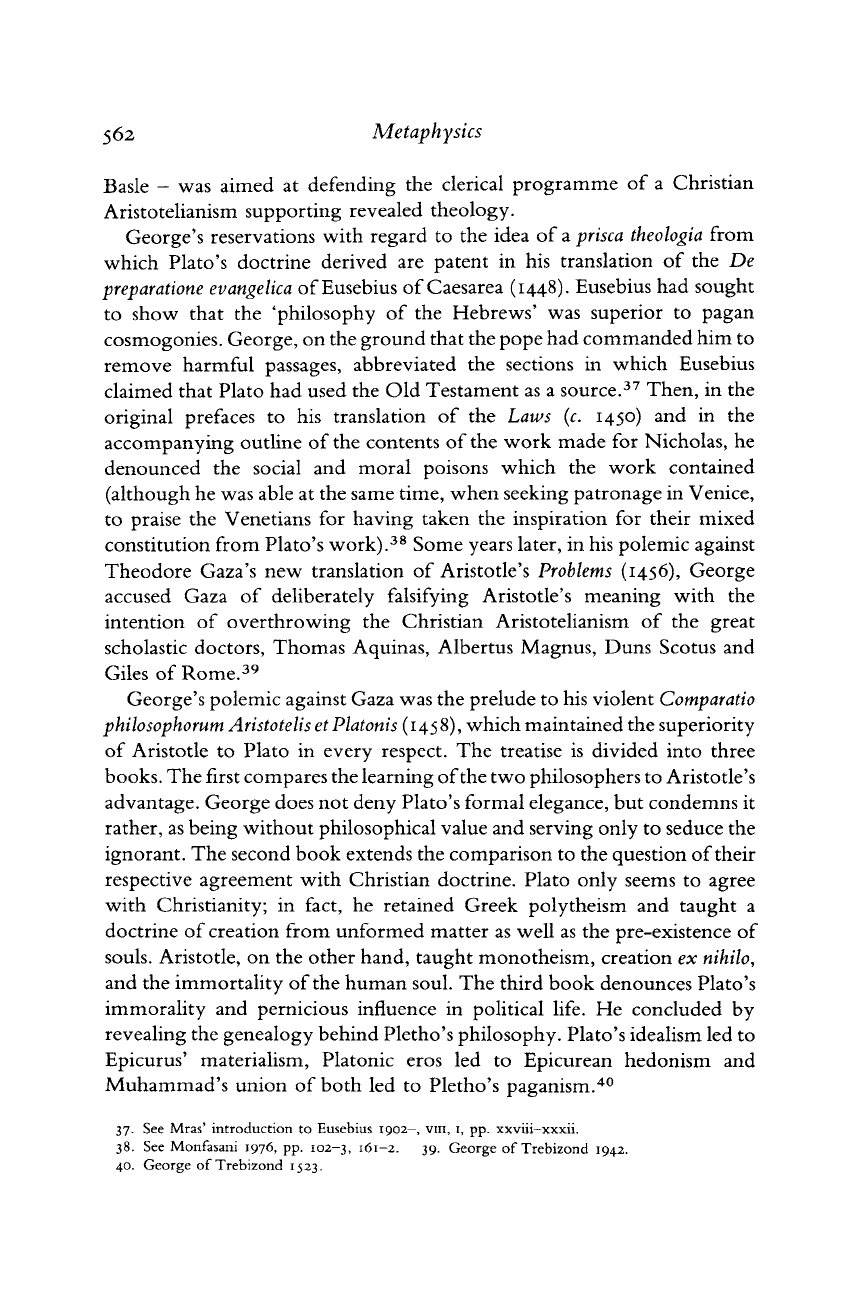
$62
Metaphysics
Basle
- was aimed at defending the clerical programme of a Christian
Aristotelianism
supporting revealed theology.
George's
reservations with regard to the idea of a prisca theologia from
which
Plato's doctrine derived are
patent
in his translation of the De
preparatione evangelica of Eusebius of Caesarea (1448). Eusebius had sought
to show
that
the 'philosophy of the Hebrews' was superior to pagan
cosmogonies.
George, on the ground
that
the pope had commanded him to
remove
harmful passages, abbreviated the sections in which Eusebius
claimed
that
Plato had used the Old Testament as a source.
37
Then, in the
original
prefaces to his translation of the
Laws
(c. 1450) and in the
accompanying
outline of the contents of the work made for Nicholas, he
denounced the social and moral poisons which the work contained
(although he was able at the same time, when seeking patronage in
Venice,
to praise the Venetians for having taken the inspiration for their mixed
constitution from Plato's work).
38
Some years later, in his polemic against
Theodore Gaza's new translation of Aristotle's Problems
(1456),
George
accused
Gaza
of deliberately
falsifying
Aristotle's meaning with the
intention of overthrowing the Christian Aristotelianism of the great
scholastic doctors, Thomas Aquinas, Albertus Magnus, Duns Scotus and
Giles
of Rome.
39
George's
polemic against
Gaza
was the prelude to his violent Comparatio
philosophorum Aristotelis et Platonis
(1458),
which maintained the superiority
of
Aristotle to Plato in every respect. The treatise is divided into
three
books.
The first compares the learning
of
the two philosophers to Aristotle's
advantage. George does not deny Plato's formal elegance, but condemns it
rather,
as being without philosophical value and serving only to seduce the
ignorant. The second book extends the comparison to the question
of
their
respective
agreement with Christian doctrine. Plato only seems to agree
with
Christianity; in fact, he retained Greek polytheism and taught a
doctrine of creation from unformed
matter
as
well
as the pre-existence of
souls.
Aristotle, on the other
hand,
taught monotheism, creation ex nihilo,
and the immortality of the human soul. The
third
book denounces Plato's
immorality and pernicious influence in political
life.
He concluded by
revealing
the genealogy behind Pletho's philosophy. Plato's idealism led to
Epicurus' materialism, Platonic eros led to Epicurean hedonism and
Muhammad's union of both led to Pletho's paganism.
40
37. See
Mras'
introduction
to
Eusebius
1902—,
vm, 1, pp.
xxviii—xxxii.
38. See
Monfasani
1976, pp.
102-3,
161-2. 39.
George
of
Trebizond
1942.
40.
George
of
Trebizond
1523.
Cambridge Histories Online © Cambridge University Press, 2008
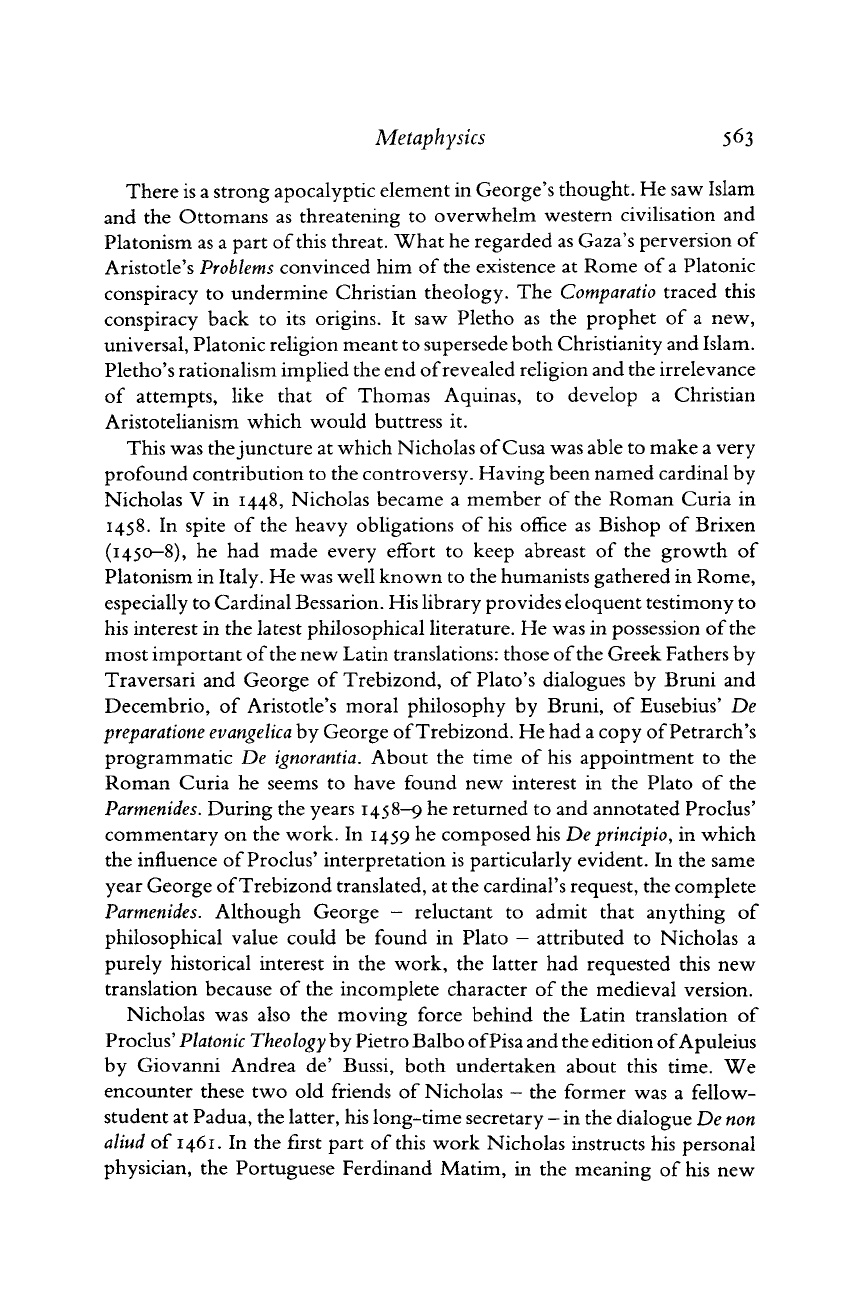
Metaphysics
There is a strong apocalyptic element in George's thought. He saw Islam
and the Ottomans as threatening to overwhelm western civilisation and
Platonism as a
part
of
this
threat.
What he regarded as Gaza's perversion of
Aristotle's
Problems convinced him of the existence at Rome of a Platonic
conspiracy
to undermine Christian theology. The Comparatio traced this
conspiracy
back to its origins. It saw Pletho as the prophet of a new,
universal,
Platonic religion meant to supersede both Christianity and Islam.
Pletho's rationalism implied the end
of
revealed
religion and the irrelevance
of
attempts, like
that
of Thomas Aquinas, to develop a Christian
Aristotelianism
which would buttress it.
This
was the juncture at which Nicholas
of
Cusa
was able to make a very
profound contribution to the controversy. Having been named cardinal by
Nicholas
V in 1448, Nicholas became a member of the Roman Curia in
1458.
In spite of the heavy obligations of his
office
as Bishop of Brixen
(1450—8),
he had made every effort to keep abreast of the growth of
Platonism in Italy. He was
well
known to the humanists gathered in Rome,
especially
to Cardinal Bessarion. His library provides eloquent testimony to
his interest in the latest philosophical literature. He was in possession of the
most important
of
the new Latin translations: those
of
the Greek Fathers by
Traversari and George of Trebizond, of Plato's dialogues by Bruni and
Decembrio,
of Aristotle's moral philosophy by Bruni, of Eusebius' De
preparatione evangelica by George
of
Trebizond.
He had a copy
of
Petrarch's
programmatic De ignorantia. About the time of his appointment to the
Roman Curia he seems to have found new interest in the Plato of the
Parmenides. During the years 1458—9 he returned to and annotated Proclus'
commentary on the work. In 1459 he composed his De principio, in which
the influence of Proclus' interpretation is particularly evident. In the same
year
George
of
Trebizond
translated, at the cardinal's request, the complete
Parmenides. Although George - reluctant to admit
that
anything of
philosophical
value could be found in Plato - attributed to Nicholas a
purely historical interest in the work, the latter had requested this new
translation because of the incomplete character of the medieval version.
Nicholas
was also the moving force behind the Latin translation of
Proclus'
Platonic Theology by Pietro Balbo
of
Pisa
and the edition
of
Apuleius
by
Giovanni Andrea de' Bussi, both undertaken about this time. We
encounter these two old friends of Nicholas - the former was a
fellow-
student at Padua, the latter, his long-time secretary - in the dialogue De non
aliud
of
1461.
In the first
part
of this work Nicholas instructs his personal
physician,
the Portuguese Ferdinand Matim, in the meaning of his new
Cambridge Histories Online © Cambridge University Press, 2008
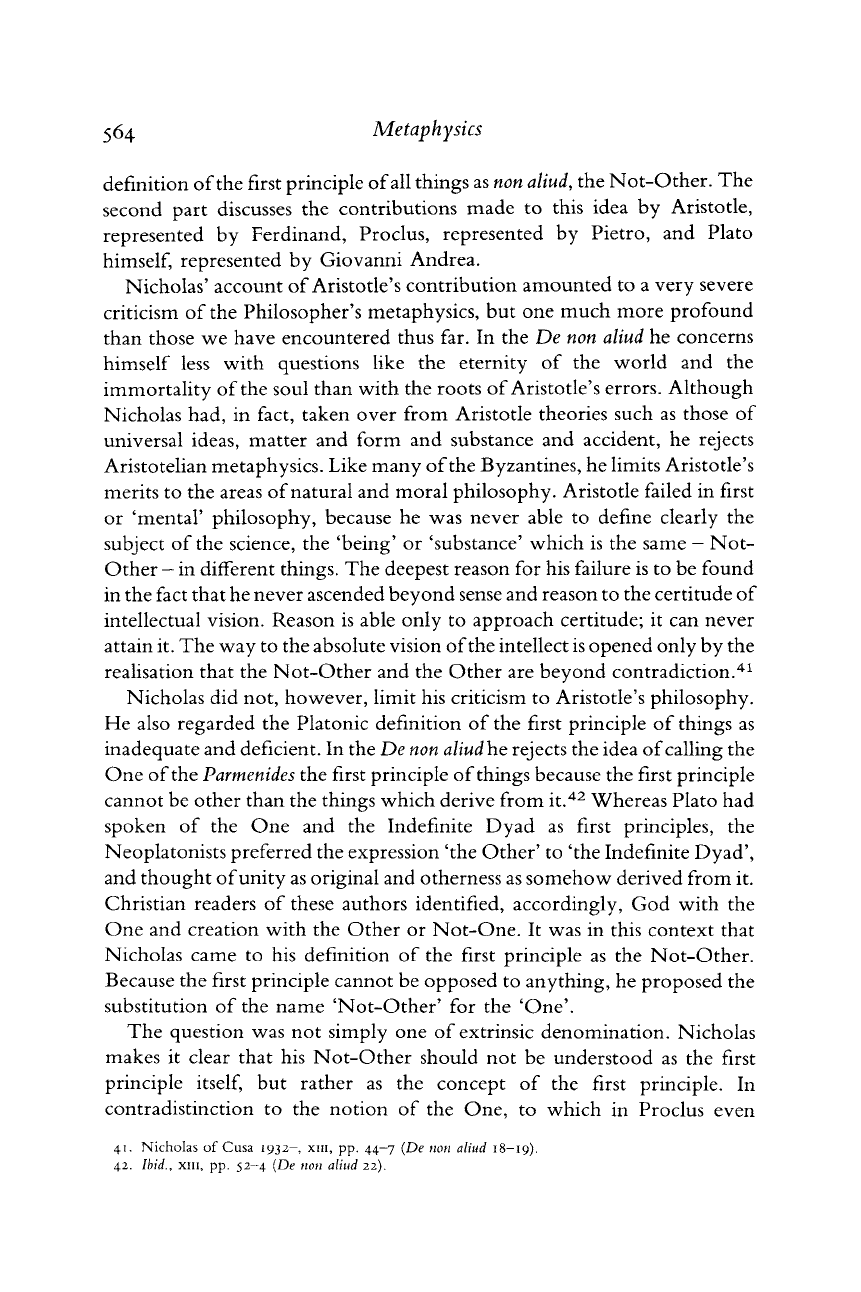
564
Metaphysics
definition
of
the first principle
of
all
things as non aliud, the Not-Other. The
second
part
discusses the contributions made to this idea by Aristotle,
represented by Ferdinand, Proclus, represented by Pietro, and Plato
himself, represented by Giovanni Andrea.
Nicholas'
account of Aristotle's contribution amounted to a very severe
criticism of the Philosopher's metaphysics, but one much more profound
than
those we have encountered
thus
far. In the De non aliud he concerns
himself
less with questions like the eternity of the world and the
immortality of the soul
than
with the roots of Aristotle's errors. Although
Nicholas
had, in fact, taken over from Aristotle theories such as those of
universal ideas,
matter
and form and substance and accident, he rejects
Aristotelian metaphysics.
Like
many
of
the Byzantines, he limits Aristotle's
merits to the areas
of
natural
and moral philosophy. Aristotle failed in first
or 'mental' philosophy, because he was never able to define clearly the
subject of the science, the 'being' or 'substance' which is the same
—
Not-
Other
—
in different things. The deepest reason for his failure is to be found
in the fact
that
he never ascended beyond sense and reason to the certitude of
intellectual vision. Reason is able only to approach certitude; it can never
attain
it. The way to the absolute vision
of
the intellect is opened only by the
realisation
that
the Not-Other and the Other are beyond contradiction.
41
Nicholas
did not, however, limit his criticism to Aristotle's philosophy.
He also regarded the Platonic definition of the first principle of things as
inadequate and deficient. In the De non aliudhe rejects the idea
of
calling
the
One
of
the Parmenides the first principle
of
things because the first principle
cannot be other
than
the things which derive from it.
42
Whereas Plato had
spoken of the One and the Indefinite Dyad as first principles, the
Neoplatonists preferred the expression 'the Other' to 'the Indefinite Dyad',
and thought
of
unity as original and otherness as somehow derived from it.
Christian readers of these
authors
identified, accordingly, God with the
One and creation with the Other or Not-One. It was in this context
that
Nicholas
came to his definition of the first principle as the Not-Other.
Because
the first principle cannot be opposed to anything, he proposed the
substitution of the name 'Not-Other' for the 'One'.
The
question was not simply one of extrinsic denomination. Nicholas
makes it clear
that
his Not-Other should not be understood as the first
principle itself, but
rather
as the concept of the first principle. In
contradistinction to the notion of the One, to which in Proclus even
41.
Nicholas
of
Cusa
1932-,
xm, pp. 44-7 (De non aliud
18-19).
42. Ibid., xm, pp. 52-4 (De non aliud 22).
Cambridge Histories Online © Cambridge University Press, 2008
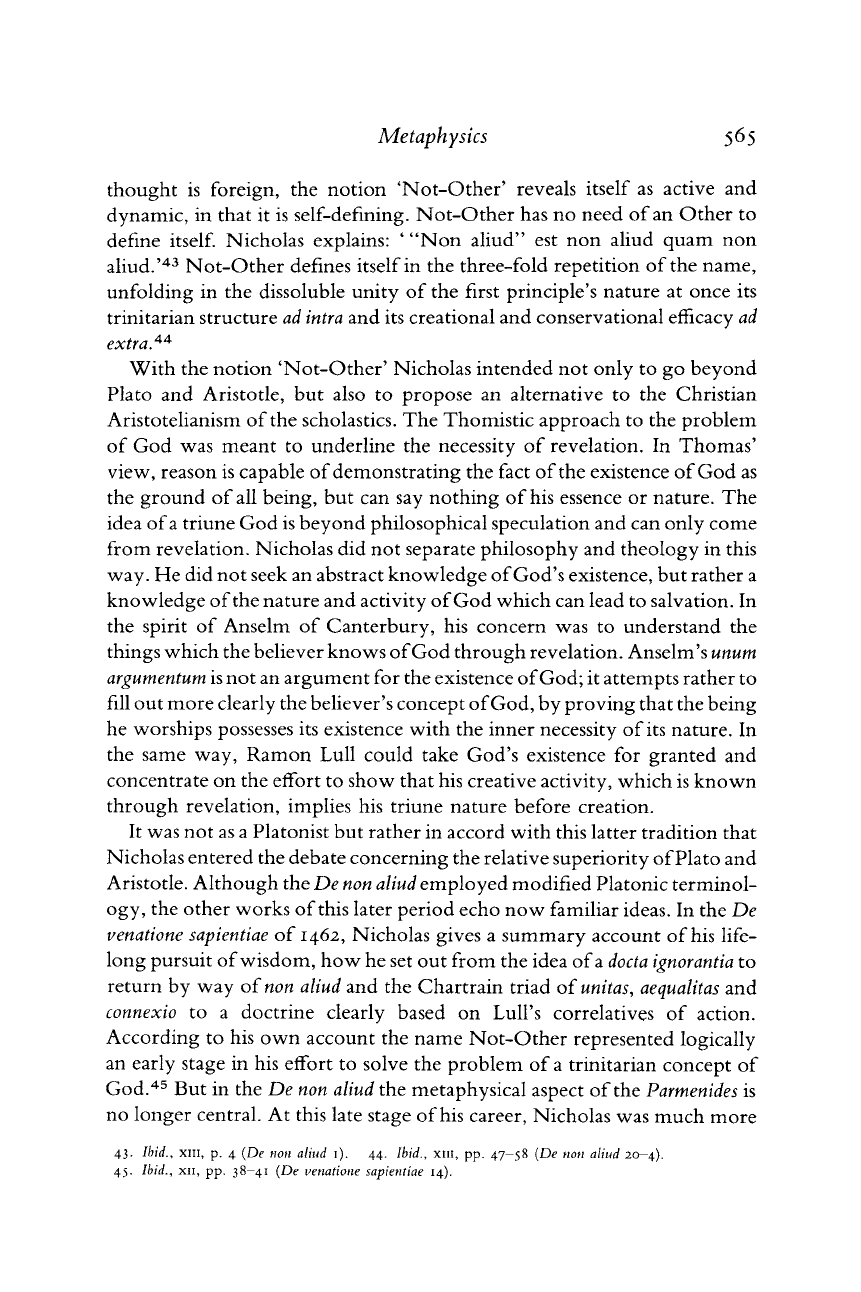
Metaphysics
565
thought is foreign, the notion 'Not-Other' reveals itself as active and
dynamic, in
that
it is self-defining. Not-Other has no need of an Other to
define itself. Nicholas explains: ' "Non aliud" est non aliud quam non
aliud.'
43
Not-Other defines itself in the three-fold repetition of the name,
unfolding in the dissoluble unity of the first principle's
nature
at once its
trinitarian structure ad intra and its creational and conservational
efficacy
ad
extra.
44
With
the notion 'Not-Other' Nicholas intended not only to go beyond
Plato and Aristotle, but also to propose an alternative to the Christian
Aristotelianism of the scholastics. The Thomistic approach to the problem
of
God was meant to underline the necessity of revelation. In Thomas'
view,
reason is capable of demonstrating the fact of the existence
of
God
as
the ground of all being, but can say nothing of his essence or nature. The
idea
of
a
triune
God is beyond philosophical speculation and can only come
from revelation. Nicholas did not separate philosophy and theology in this
way.
He did not seek an abstract knowledge
of
God's
existence, but
rather
a
knowledge
of
the
nature
and activity
of
God
which can lead to salvation. In
the spirit of Anselm of Canterbury, his concern was to understand the
things which the believer knows
of
God
through revelation. Anselm's
unum
argumentum
is not an argument for the existence
of
God;
it attempts
rather
to
fill
out more clearly the believer's concept
of
God,
by proving
that
the being
he worships possesses its existence with the inner necessity of its nature. In
the same way, Ramon
Lull
could take God's existence for granted and
concentrate on the effort to show
that
his creative activity, which is known
through revelation, implies his
triune
nature
before creation.
It was not as a Platonist but
rather
in accord with this latter tradition
that
Nicholas
entered the debate concerning the relative superiority
of
Plato and
Aristotle.
Although the De non aliud employed modified Platonic terminol-
ogy,
the other works
of
this later period echo now familiar ideas. In the De
venatione sapientiae of 1462, Nicholas
gives
a summary account of his
life-
long
pursuit
of
wisdom,
how he set out from the idea
of
a docta ignorantia to
return
by way of non aliud and the Chartrain triad of unitas, aequalitas and
connexio to a doctrine clearly based on Lull's correlatives of action.
According
to his own account the name Not-Other represented
logically
an early stage in his effort to solve the problem of a trinitarian concept of
God.
45
But in the De non aliud the metaphysical aspect of the Parmenides is
no longer central. At this late stage
of
his career, Nicholas was much more
43. Ibid.,
XIII,
p. 4 (De non aliud i). 44. Ibid., xin, pp.
47-58
(De non aliud
20-4).
45. Ibid., XII, pp. 38-41 (De venatione sapientiae 14).
Cambridge Histories Online © Cambridge University Press, 2008
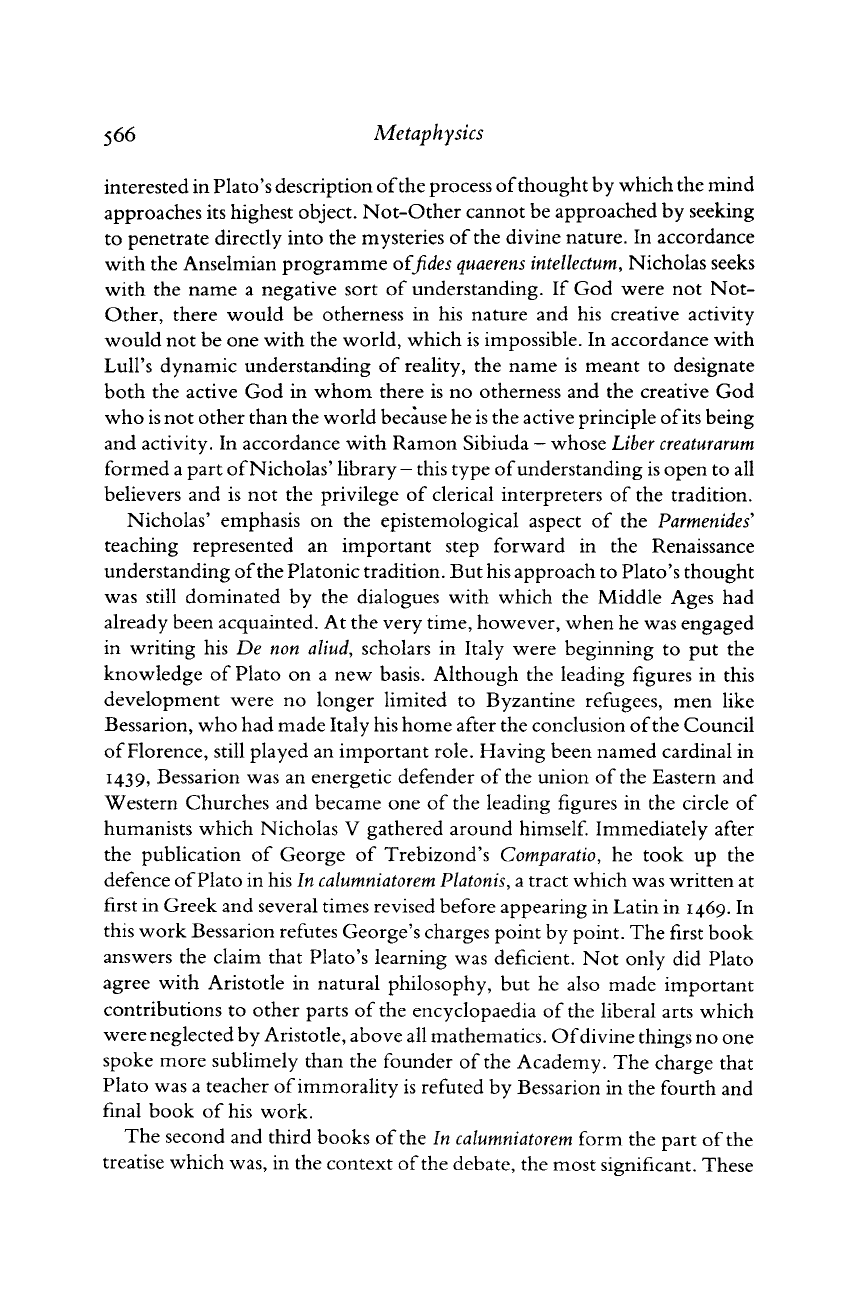
Metaphysics
interested in Plato's description
of
the process
of
thought by which the mind
approaches its highest object. Not-Other cannot be approached by seeking
to penetrate directly into the mysteries of the divine nature. In accordance
with
the Anselmian programme of'fides quaerens intellectum, Nicholas seeks
with
the name a negative sort of understanding. If God were not Not-
Other,
there
would be otherness in his
nature
and his creative activity
would
not be one with the world, which is impossible. In accordance with
Lull's
dynamic understanding of reality, the name is meant to designate
both the active God in whom
there
is no otherness and the creative God
who
is not other
than
the world because he is the active principle
of
its being
and activity. In accordance with Ramon Sibiuda
—
whose Liber creaturarum
formed a
part
of
Nicholas'
library
—
this type
of
understanding is open to all
believers
and is not the privilege of clerical interpreters of the tradition.
Nicholas'
emphasis on the epistemological aspect of the Parmenides"
teaching represented an important step forward in the Renaissance
understanding
of
the Platonic tradition. But his approach to Plato's thought
was
still dominated by the dialogues with which the Middle
Ages
had
already been acquainted. At the very time, however, when he was engaged
in writing his De non aliud, scholars in Italy were beginning to put the
knowledge
of Plato on a new basis. Although the leading figures in this
development were no longer limited to Byzantine refugees, men like
Bessarion, who had made Italy his home after the conclusion
of
the Council
of
Florence, still played an important role. Having been named cardinal in
1439,
Bessarion was an energetic defender of the union of the Eastern and
Western Churches and became one of the leading figures in the circle of
humanists which Nicholas V gathered around himself. Immediately after
the publication of George of Trebizond's Comparatio, he took up the
defence
of
Plato in his In calumniator em Platonis, a tract which was written at
first in Greek and several times revised before appearing in Latin in 1469. In
this work Bessarion refutes George's charges point by point. The first book
answers the claim
that
Plato's learning was deficient. Not only did Plato
agree with Aristotle in natural philosophy, but he also made important
contributions to other
parts
of the encyclopaedia of the liberal
arts
which
were neglected by Aristotle, above all mathematics.
Of
divine things no one
spoke more sublimely
than
the founder of the Academy. The charge
that
Plato was a teacher
of
immorality is refuted by Bessarion in the fourth and
final
book
of his work.
The
second and
third
books of the In calumniatorem form the
part
of the
treatise which was, in the context
of
the debate, the most significant. These
Cambridge Histories Online © Cambridge University Press, 2008
